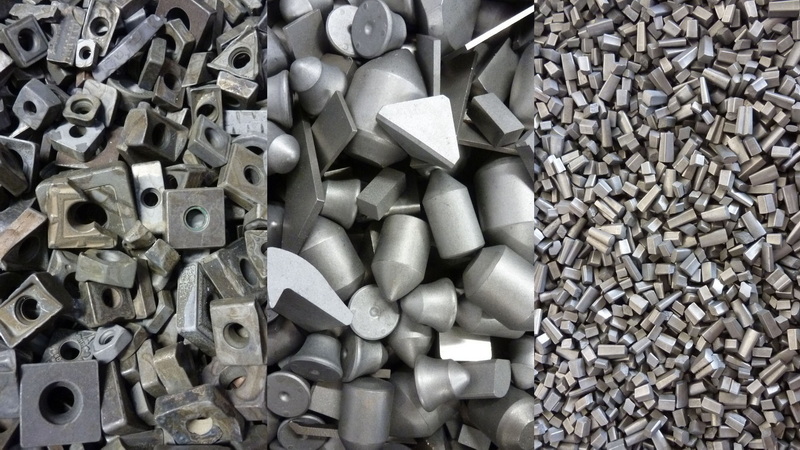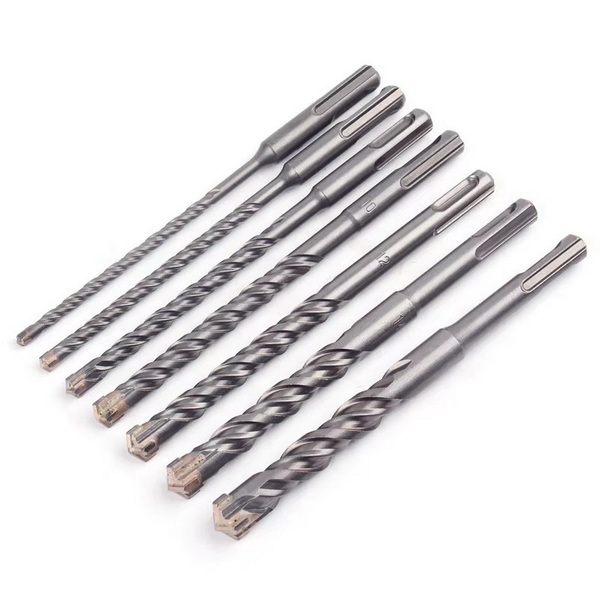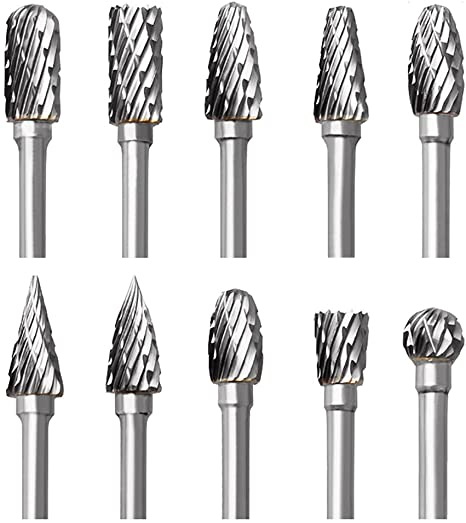Content Menu
● What is Tungsten Carbide?
● Physical Characteristics of Tungsten Carbide
>> Color and Texture
>> Hardness
>> Density
>> Melting Point
>> Appearance in Jewelry
>> Corrosion Resistance
● Applications of Tungsten Carbide
>> 1. Industrial Tools
>> 2. Jewelry
>> 3. Aerospace
>> 4. Oil & Gas
>> 5. Medical Instruments
>> 6. Automotive Industry
● How is Tungsten Carbide Manufactured?
● Visual Examples of Tungsten Carbide
● Advantages of Tungsten Carbide
● Conclusion
● FAQs About Tungsten Carbide
>> 1. What does tungsten carbide look like?
>> 2. How hard is tungsten carbide compared to steel?
>> 3. Can tungsten carbide be recycled?
>> 4. Is tungsten carbide suitable for jewelry?
>> 5. What industries commonly use tungsten carbide?
● Citations:
Tungsten carbide is a highly versatile and durable material widely used in industrial applications, jewelry, and cutting tools. Its unique appearance and properties make it a popular choice in various fields. This article explores the physical characteristics, applications, benefits, and manufacturing process of tungsten carbide, along with frequently asked questions about this remarkable material.

What is Tungsten Carbide?
Tungsten carbide (chemical formula: WC) is a compound composed of tungsten and carbon atoms in equal proportions. It is typically gray or silver-gray in color, with a metallic sheen that gives it a distinctive "gunmetal" appearance. In its raw form, tungsten carbide is a fine gray powder, but it can be sintered into solid shapes for use in tools, machinery, and decorative items.
Physical Characteristics of Tungsten Carbide
Color and Texture
- Tungsten carbide has a natural silver-gray or bluish-gray color, often described as "gunmetal."
- When polished, it exhibits a smooth and reflective surface similar to stainless steel.
- It can also be finished with textures such as sandblasting or hammering for aesthetic purposes.
Hardness
- Tungsten carbide ranks 9 to 9.5 on the Mohs scale of hardness, making it second only to diamonds.
- This extreme hardness contributes to its scratch resistance and durability.
Density
- It is approximately twice as dense as steel, giving it a solid and heavy feel.
- The high density makes it ideal for applications requiring stability under pressure.
Melting Point
- Tungsten carbide has an exceptionally high melting point of 2,870°C (5,198°F), making it suitable for high-temperature environments.
Appearance in Jewelry
Tungsten carbide jewelry often features various finishes:
- Polished: A mirror-like surface that reflects light beautifully.
- Matte: A subdued finish achieved through sandblasting.
- Colored: Modern techniques like ion plating allow tungsten carbide rings to come in colors such as black, blue, or gold.
Corrosion Resistance
Another notable characteristic of tungsten carbide is its resistance to corrosion. Unlike traditional metals that may rust or tarnish over time, tungsten carbide remains unaffected by exposure to moisture or chemicals. This property makes it ideal for applications in harsh environments.
Applications of Tungsten Carbide
Tungsten carbide's unique properties make it indispensable across numerous industries:
1. Industrial Tools
- Used in cutting tools like drill bits, saw blades, and milling cutters due to its hardness and wear resistance.
- Commonly applied in mining equipment such as drill heads and cutting picks.
- Its strength allows tools to maintain their sharpness even after prolonged use.
2. Jewelry
- Popular for rings and bracelets because of its durability and scratch resistance.
- Often combined with materials like wood or carbon fiber for aesthetic appeal.
- Tungsten carbide jewelry is hypoallergenic, making it suitable for individuals with sensitive skin.
3. Aerospace
- Protects turbine blades and other components from wear and erosion in high-stress environments.
- Its ability to withstand extreme temperatures makes it ideal for aerospace applications.
4. Oil & Gas
- Coatings on drilling equipment improve resistance to abrasion and corrosion.
- Used in valves and seals where durability under pressure is essential.
5. Medical Instruments
- Used in surgical tools for its precision and corrosion resistance.
- The hardness ensures that medical instruments retain their sharp edges during repeated use.
6. Automotive Industry
Tungsten carbide is increasingly being used in the automotive sector:
- Engine components such as fuel injectors benefit from its wear resistance.
- Brake pads coated with tungsten carbide improve durability.

How is Tungsten Carbide Manufactured?
Tungsten carbide is produced through a process called sintering:
1. Powdered tungsten is mixed with carbon black.
2. The mixture is heated at high temperatures (1,400–1,600°C) in the presence of hydrogen.
3. A binder metal like cobalt is added to enhance toughness.
4. The material is pressed into shapes and further heated to achieve its final form.
The sintering process ensures that tungsten carbide achieves its characteristic hardness while maintaining structural integrity. Advanced manufacturing techniques allow the creation of intricate designs for jewelry or specialized tools.
Visual Examples of Tungsten Carbide
Below are some examples of tungsten carbide products:
1. Drill Bits
Drill bits tipped with tungsten carbide are known for their durability and ability to cut through tough materials like concrete or metal.
2. Saw Blades
Circular saw blades with tungsten carbide teeth offer excellent cutting performance and longevity compared to traditional steel blades.
3. Jewelry
Polished tungsten carbide rings showcase their reflective surface while maintaining scratch resistance—ideal for wedding bands or fashion accessories.
4. Industrial Tools
Cutting tools made from tungsten carbide are used extensively in manufacturing processes where precision and durability are crucial.
5. Automotive Components
Fuel injector nozzles coated with tungsten carbide improve efficiency by reducing wear over time.
Advantages of Tungsten Carbide
Tungsten carbide offers several benefits that make it stand out as a material of choice:
1. Durability
Its hardness ensures long-lasting performance even under extreme conditions.
2. Scratch Resistance
Jewelry made from tungsten carbide remains pristine despite daily wear.
3. Heat Resistance
The high melting point allows use in high-temperature applications like aerospace turbines.
4. Corrosion Resistance
Unlike steel or iron alloys, tungsten carbide does not rust or degrade when exposed to moisture or chemicals.
5. Eco-Friendly Recycling
Scrap tungsten carbide can be recycled efficiently without losing its quality.
Conclusion
Tungsten carbide is a remarkable material known for its exceptional hardness, wear resistance, corrosion resistance, and versatility. Its metallic gray appearance makes it visually appealing while its physical properties make it indispensable in industrial applications ranging from cutting tools to aerospace components—and even jewelry design. Whether you encounter tungsten carbide in your toolbox or on your finger as part of a ring, its unique combination of beauty and strength ensures that this material will continue to be valued across industries for years to come.

FAQs About Tungsten Carbide
1. What does tungsten carbide look like?
Tungsten carbide has a metallic silver-gray or bluish-gray color with a gunmetal-like appearance. It can be polished for a shiny finish or textured for a matte look.
2. How hard is tungsten carbide compared to steel?
Tungsten carbide is significantly harder than steel, ranking 9–9.5 on the Mohs scale compared to steel's 4–8. This makes it more resistant to scratches and wear.
3. Can tungsten carbide be recycled?
Yes, worn-out tools and scrap tungsten carbide can be recycled through specialized processes that recover the material for reuse without compromising quality.
4. Is tungsten carbide suitable for jewelry?
Absolutely! Its durability, scratch resistance, hypoallergenic properties, and ability to hold various finishes make it ideal for rings, bracelets, necklaces, and other jewelry items.
5. What industries commonly use tungsten carbide?
Industries such as aerospace, oil & gas exploration, mining operations, automotive manufacturing, medical fields, and construction rely on tungsten carbide for its strength and wear resistance.
Citations:
[1] https://www.linde-amt.com/resource-library/articles/tungsten-carbide
[2] https://en.wikipedia.org/wiki/Tungsten_carbide
[3] https://www.thermalspray.com/understanding-the-unique-characteristics-of-tungsten-carbide/
[4] https://www.alamy.com/stock-photo/tungsten-carbide.html
[5] https://www.samaterials.com/tungsten-carbide-cobalt-an-overview.html
[6] https://www.britannica.com/science/tungsten-carbide
[7] https://www.retopz.com/57-frequently-asked-questions-faqs-about-tungsten-carbide/
[8] https://tuncomfg.com/about/faq/
[9] https://stevengdesigns.com/blogs/news/the-difference-between-tungsten-and-tungsten-carbide
[10] https://eternaltools.com/blogs/tutorials/tungsten-carbide-an-informative-guide
[11] https://www.estoolcarbide.com/article/why-is-tungsten-carbide-the-material-of-choice-for-cutting-tool-inserts--newsinfo-49.html
[12] http://www.carbidetechnologies.com/faqs/
[13] https://www.tungco.com/insights/blog/5-tungsten-carbide-applications/
[14]https://ringsbylux.com/collections/tungsten-carbide-rings
[15] https://eternaltools.com/blogs/tutorials/tungsten-carbide-an-informative-guide
[16] https://www.imetra.com/tungsten-carbide-material-properties/
[17] https://www.tungstenrings.com/tungsten-carbide-rings-facts-fiction/
[18] https://www.azom.com/properties.aspx?ArticleID=1203
[19] https://www.aemmetal.com/news/top-20-tungsten-metal-uses.html
[20] https://www.youtube.com/watch?v=g_YpNM1FBhs
[21] https://www.azom.com/article.aspx?ArticleID=1203
[22] https://almonty.com/tungsten-history/
[23] https://www.embr.com/blogs/news/what-does-tungsten-vs-tungsten-carbide-really-mean
[24] https://www.dymetalloys.co.uk/what-is-tungsten-carbide/tungsten-carbide-grades-applications
[25] https://forums.autodesk.com/t5/inventor-forum/carbide-tungsten-material/td-p/5820545
[26] https://www.larsonjewelers.com/pages/tungsten-rings-pros-cons-facts-myths
[27] https://tungstensuppliers.com/gallery/
[28] https://www.shutterstock.com/search/tungsten-carbide
[29] https://www.reddit.com/r/pics/comments/1aoqq0/a_perfectly_polished_tungsten_carbide_cube/
[30] https://stock.adobe.com/search?k=tungsten+carbide
[31] https://periodictable.com/Elements/074/pictures.html
[32] https://stock.adobe.com/search?k=carbide
[33] https://www.shutterstock.com/search/tungsten
[34] https://www.freepik.com/free-photos-vectors/tungsten-carbide
[35] https://www.nj.gov/health/eoh/rtkweb/documents/fs/1960.pdf
[36] https://www.aemmetal.com/news/tungsten-carbide-vs-titanium.html
[37] https://generalcarbide.com/pdf/General-Carbide-Designers-Guide-Tungsten-Carbide.pdf
[38] https://www.sciencedirect.com/topics/chemical-engineering/tungsten-carbide
[39] https://ewsllp.in/why-to-choose-tungsten-carbide-over-other-metals/
[40] https://www.coorstek.com/en/materials/tungsten-carbide/
[41] https://pmc.ncbi.nlm.nih.gov/articles/PMC11949206/
[42] https://www.sciencedirect.com/topics/physics-and-astronomy/tungsten-carbide
[43] https://www.samaterials.com/content/how-does-the-new-tungsten-carbide-coating-strengthen-aircraft-parts.html
[44] https://grafhartmetall.com/en/the-advantages-of-tungsten-carbide-over-traditional-tools/
[45] https://www.sciencedirect.com/topics/chemistry/tungsten-carbide
[46] https://www.reddit.com/r/askscience/comments/f02z1/materials_science_question_why_does_an_extremely/
[47] https://www.yatechmaterials.com/en/cemented-carbide-industry/answers-to-questions-about-the-use-of-tungsten-carbide-edm-blocks/
[48] https://theartisanrings.com/pages/tungsten-rings-faqs
[49] https://www.bladeforums.com/threads/tungsten-carbide-question.524307/
[50] https://www.eng-tips.com/threads/question-regarding-tungsten-carbide-brazing.293005/
[51] https://consolidatedresources.com/blog/10-facts-about-tungsten-carbide/
[52] https://www.tungstenringsco.com/faq
[53] https://www.retopz.com/wp-content/uploads/2024/12/57-Frequently-Asked-Questions-FAQs-about-tungsten-carbide.jpeg?sa=X&ved=2ahUKEwiY75_nn9SMAxUKC3kGHWfRN2AQ_B16BAgCEAI
[54] https://www.tungstenworld.com/pages/tungsten-news-common-questions-about-tungsten
[55] https://www.carbidetek.com/faqs/
[56] https://www.tungstenrepublic.com/Tungsten-Carbide-Rings-FAQ.html
[57] https://eternaltungsten.com/Frequently-Asked-Questions-FAQs
[58] https://www.allied-material.co.jp/en/techinfo/tungsten_carbide/features.html
[59] https://www.istockphoto.com/photos/tungsten-carbide?page=2
[60] https://pixabay.com/images/search/carbide/
[61] https://www.istockphoto.com/photos/tungsten-carbide
[62] https://create.vista.com/photos/tungsten-carbide/
[63] https://www.istockphoto.com/photos/tungsten-carbide-drill-bits
[64] https://rrcarbide.com/understanding-tungsten-carbide-composition-uses-and-expertise/
[65] https://www.carbide-part.com/blog/exploring-the-advantages-of-tungsten-carbide-excellent-corrosion-resistance/
[66] https://www.tungco.com/insights/blog/5-tungsten-carbide-applications/
[67] https://www.reddit.com/r/metallurgy/comments/ub4dg9/question_about_tungsten_carbide_toxicity/
[68] https://www.tungco.com/insights/blog/frequently-asked-questions-used-tungsten-carbide-inserts/
















